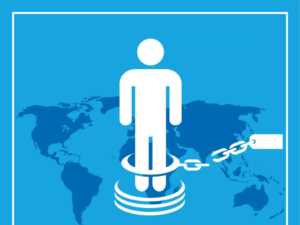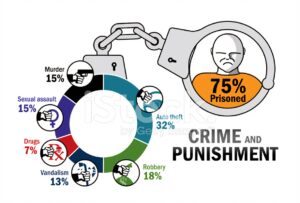Back to: Religion and National Value JSS 3
Welcome to class!
In today’s class, we’re going to be talking about the Corresponding Punishments for Each Crime. I trust you will enjoy the class!
Corresponding Punishments for Each Crime
Introduction
In Nigeria, like in all countries, laws are created to maintain order, protect people, and ensure a just society. When someone breaks these laws, they commit a crime. The purpose of punishment is not just to penalize the offender, but also to deter others, rehabilitate the criminal, and protect the community.
Understanding Different Types of Crimes

Crimes vary widely in severity and impact. Here are some common types:
- Crimes against people: Murder, assault, kidnapping, rape, etc.
- Crimes against property: Theft, burglary, vandalism, arson.
- Financial crimes: Fraud, embezzlement, money laundering.
- Crimes against the state: Treason, terrorism, sedition.
The Nigerian Legal System and Punishment

Nigeria’s legal system is complex, with both federal and state laws. Here’s how punishments are generally decided:
- The Criminal Code Act: This is the main law outlining most crimes and their punishments.
- Sharia Law: In some states, Islamic law (Sharia) is used for certain offenses, particularly in personal and family matters.
- Customary Law: In some cases, traditional laws and customs can influence legal decisions, especially in rural communities.
- The Courts: Judges decide punishments based on the severity of the crime, the offender’s history, and any mitigating circumstances.
Examples of Punishments in Nigeria

- Fines: Used for less serious offenses like traffic violations or minor property damage.
- Community Service: Often for first-time offenders or those convicted of minor crimes.
- Imprisonment: The length of imprisonment depends on the seriousness of the crime. It can range from a few weeks to life sentences.
- Death Penalty: The most severe punishment, reserved for the most serious crimes like murder or treason. (Note: There’s ongoing debate about the death penalty in Nigeria.)
Engaging Questions for Students
- Why do you think it’s important for punishments to fit the crime?
- What are some alternative punishments besides imprisonment that might help rehabilitate offenders?
- How does the Nigerian legal system balance the need for justice with the need for mercy and rehabilitation?
- What are some challenges facing the Nigerian legal system in delivering fair and consistent justice?
Interesting Facts
- Did you know that Nigeria has a Juvenile Justice system for offenders under 18?
- There are organizations like the Nigerian Prisons Service that work to reform and rehabilitate prisoners.
- The Nigerian legal system is influenced by British common law and traditional African customs.
Conclusion
Understanding the different punishments for various crimes is key to understanding how justice is carried out in Nigeria. It’s a complex system with ongoing debates and challenges, but its goal is to maintain order, protect citizens, and ensure a just society for all.
We have come to the end of today’s class. I hope you enjoyed the class!
In the next class, we shall be discussing Causes and Influences of negative behavior in individuals and society
In case you require further assistance or have any questions, feel free to ask in the comment section below, and trust us to respond as soon as possible. Cheers!
